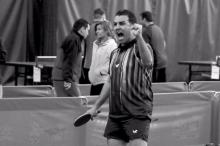Some players know how to anticipate and adjust quite well during a match, usually these players are viewed as being “SMART”; while others don’t anticipate and don’t adjust well. On the surface, this article might seem like common sense, but this there is much more depth here. Let’s dig in…
Here is the dictionary definition of anticipation:
The action of anticipating something; expectation or prediction.
Smart Guy
An anticipating player might serve short topspin, get his racket up a bit, expecting to loop the fast flip coming. This same player might push deep to the backhand, move in, and prepare for a fast block against the predictable loop. This same player might play to your wide forehand and adjust his ready position to cover his wide forehand angle. You see, these players anticipate the most likely return and prepare properly by playing the odds. Against this player, you might need to take some risk. You might need to push his topspin serve, you might need to loop to different locations than normal, and you might need to vary the spin, speed, height, and depth more. This same opponent might adjust well to your serve. You serve heavy backspin and he pushes into the top of the net. After the point, he steps back and ponders for a moment and preparing to adjust for the next serve. In this case, you might want to change your serve because he has mentally made the adjustment.
Dumb Guy
A player who doesn’t anticipate well might stand in exactly the same position for every shot. He plays to your wide forehand then makes a beeline back to the middle of the table; he serves long and has no idea that you might possible loop; he tries to mentally stay completely neutral for every shot. In this situation, play your best shot – if he serves an angle, then play the angle sharper back. If he pops up a high ball, then just smash your best smash crosscourt. There is no sense in trying to be tricky if your normal stuff is working. Also, if he doesn’t adjust well to your serves, then be willing to repeat them. If your deep serve to his backhand is working and he continually power blocks it into the table, keep repeating it. If he is that dumb that he doesn’t make a single attempt to adjust, continue to use your main tactic again and again. About 1-2 years ago, Han Xiao wrote an article about Not Changing For the Sake of Changing. I totally agree with Han. If something is working and your opponent isn’t adjusting, then continue winning points with what is working. There is no reason to continue experimenting with something that might, possibly, maybe, could work.
I’m going to conclude with a few summary thoughts…
Your Approach
So how can you label someone as an anticipator or a non-anticipator? Does it have to do with age, hair style, glasses, rating, equipment, or personality? No, no, no! You don’t need to label them at the start of the match. Just play your best and think about it carefully as the match progresses.
Your Game
At the start of the match, the main thing is to play your best game. Use your good serves and your strong loops, continue to move and play your best.
Analysis
If you are winning, then don’t worry about labeling him. If you begin to lose, then ask yourself some questions. When I hit a normal loop to an obvious location, is he waiting there ready to return it? When I hit a tricky loop to an awkward location, is he surprised? When I win a point with my serve and serve it again, does he miss it the second time in the same manner? As you begin asking yourself questions, then you will know on whether to play normal consistent shot or if you need to be “tricky”.
Your Comfort Level
If you can’t win with your normal game and you must play “trickier” than normal, you must remember your comfort level and try to stay within your range of consistency. I have seen many players who tried to do so many weird things each hit, that they just beat themselves.
Training
After the tournament, when you get back to the training hall, ask yourself the questions as to quick tricky strokes you should be developing. Even during a normal drill in practice (like two backhands and two forehands) you should try to add some variations – faster and slower, higher and lower, deeper and shorter, more spin and less spin, right lateral sidespin and left lateral sidespin. During the practice sessions, you should develop some tricky variations. That way, you can feel confident to give variations in games at the right time.
Score
This article might be very confusing for some players. If you have no idea if you are playing an anticipator or not, then just do this one thing for me… If you are winning, stick with your main tactics. If you are losing, then look to make necessary adjustments. That’s it!
Devastate the Smart/Dumb Guy

Tactics for 2 Different Opponents
Category:



